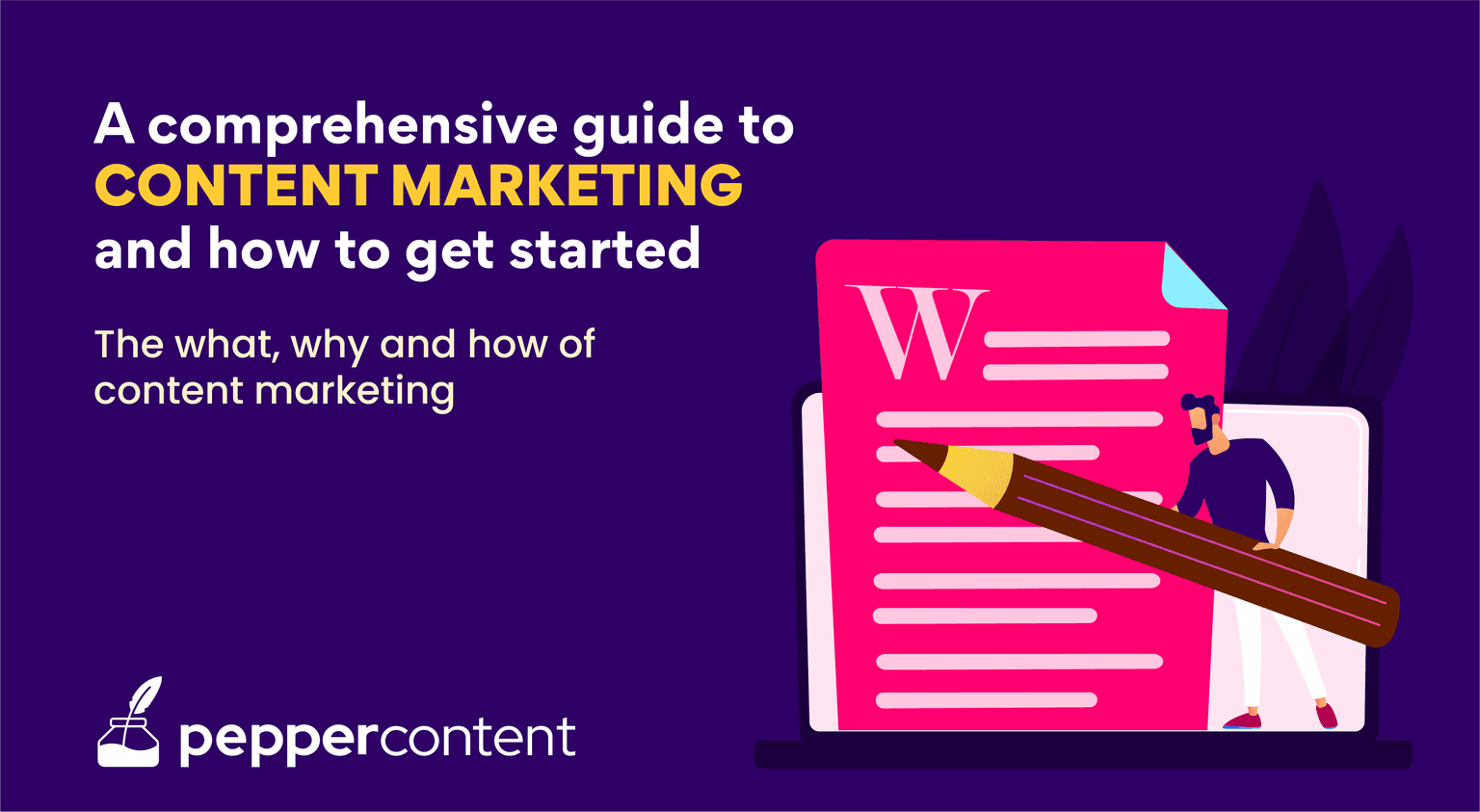
Table of Contents
- Why is Content Marketing Important?
- Types of Content Marketing
- Build your Content Marketing Strategy
- Key Takeaways
- Conclusion
- FAQs
Suppose you want to take your business online and use content to generate leads and create brand awareness. In that case, you must draft a compelling content marketing strategy that favors your business objectives. This comprehensive guide to internet content marketing will help you learn the tricks of the trade.
Content marketing is the holy grail of modern advertising. The idea is to promote your brand online and generate quality leads for your business using content of all types and formats – from blogs to Tweets, videos, and even memes! With extensive research, you can draft an effective content marketing strategy that favors your business objectives. A business draws up a content marketing brief that outlines the needs of its target audience, the ongoing trends, budget, and other factors to streamline the content creation process. If you want to take your business online and use content to generate leads and create brand awareness, you must know what works and what doesn’t. So, here’s the most comprehensive guide to content marketing on the internet.
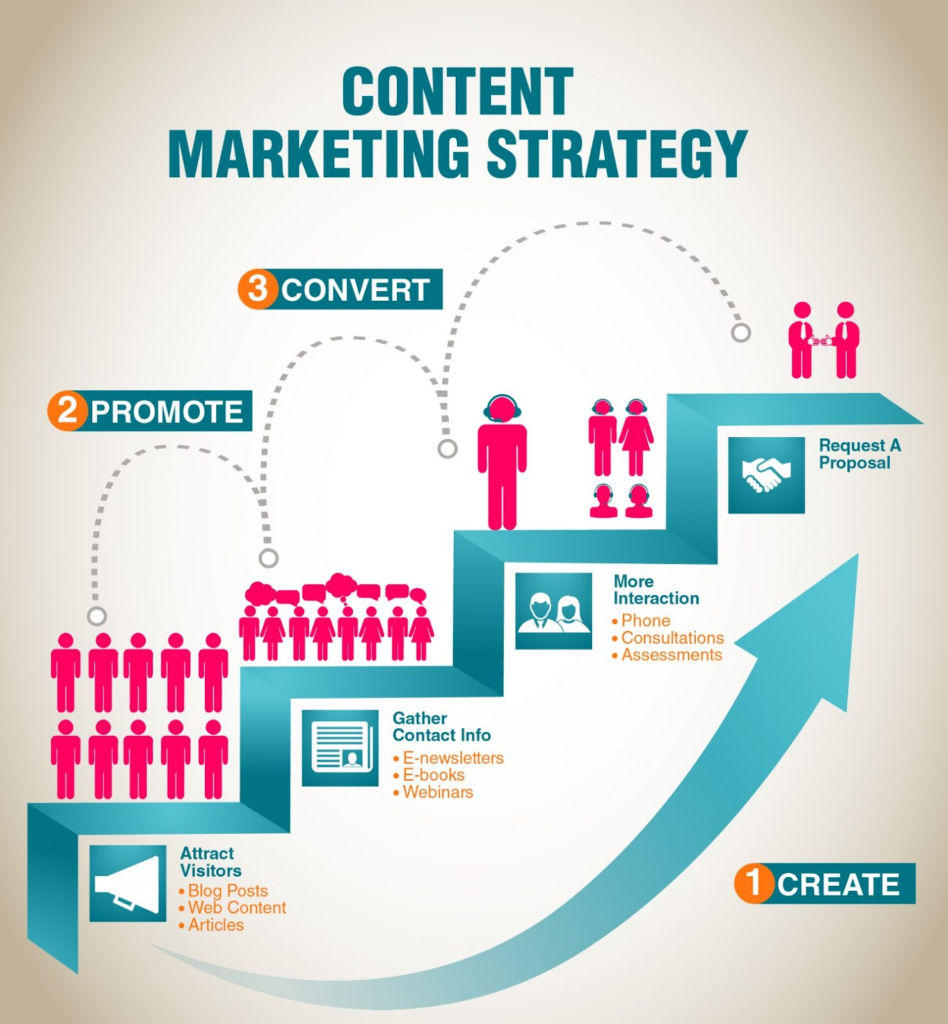
Let’s get started by understanding the relevance of a content marketing strategy that helps convert prospects into loyal advocates for your brand.
Why is Content Marketing Important?
Content marketing is the process of strategizing, creating, distributing, promoting, sharing, and conveying your brand’s message to your target audience. A content marketing strategy can streamline your efforts to generate leads and convert prospects into happy consumers.
The chief objective of your content marketing strategy is to generate loyalty by
- Educating your leads about the services and products your offer
- Boosting the conversion rate of each marketing effort
- Building a relationship with your target market through quality experiences
- Offering your brand as the solution to a problem people face
- Building a community of loyal followers for your business or brand
With an effective content marketing strategy in place, you can scale up your business to meet the demands of users. Let’s now explore some popular forms of content marketing.
With an effective content marketing strategy in place, you can scale up your business to meet the demands of users. Let’s now explore some popular forms of content marketing.
Types of Content Marketing
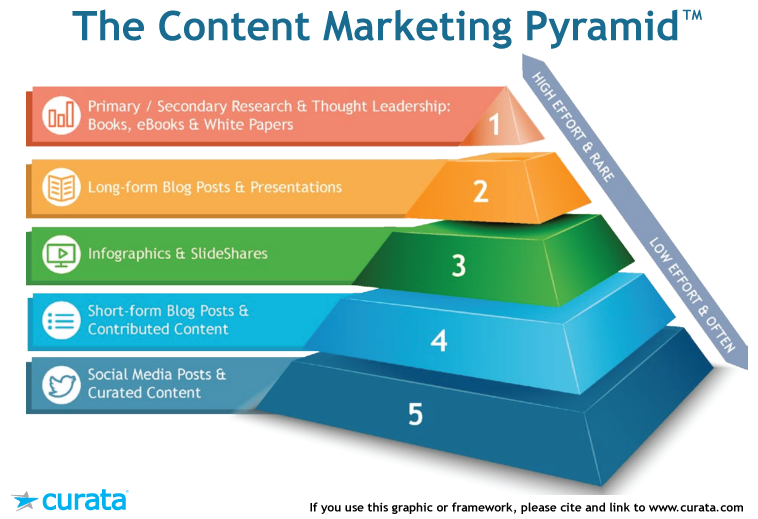
Social media marketing
More than 4.2 billion social media users can be considered a vast market that every brand is looking to tap into. Facebook, Instagram, Twitter, YouTube, Snapchat, Pinterest, and LinkedIn are just a few of the most popular social media platforms that can be used to boost your market share. More and more companies are investing in social media marketing for business promotions because of the prolific activities and stupendous engagement on these platforms. Using photos, videos, forms, stories, and social media ads, businesses can tap into the reach of this vast user base on each social media channel.

Blogs and whitepapers
Blogs are an efficient way to engage with prospects by nurturing their interest in your brand. In a highly competitive age of information, a blog is a first-hand communication tool that shows the authenticity of your brand. It is an integral part of the content marketing strategies of most companies. Blogs are also a great way of simplifying complex information for regular consumption. There are more than 600 million blogs on the internet, out of the 1.7 billion websites, according to statistics published by Oberlo.in.

Podcasts
Podcasts are gaining massive popularity as a crucial internet content marketing tool. The influence of Spotify, Podbean, BuzzSprout, SoundCloud, and numerous other audio-listening services have made podcasts very popular. People looking for easy ways to gain insights into various topics rely on podcasts as a source of information. There are an estimated 30 million podcast episodes online, from over 850,000 active podcasts, according to Oberlo.in. The Daily is a podcast by New York Times publishers, which recorded a whopping 1.1 million downloads every weekday during 2018 and close to 2 million in 2020.
Infographics
Infographics are widely used in social media posts, presentations, webinars, videos, and images to convey information easily to readers. People find infographics effective and easy to understand because they communicate complex data in a simple, visual manner easy to grasp. Data visualization is a growing trend in content marketing, where extensive studies can be condensed into bite-size infographics to better the viewing experience. The use of colors in visuals for infographics increases the attention span of users by up to 82%.
Video marketing
Videos are the most consumed form of content on the internet. 87% of all marketing experts use videos as promotional tools. Video has emerged as the most popular element in content marketing strategies globally in recent times. Studies show that an average user spends about 7 hours a week watching videos online. That’s a huge market that any business can penetrate with quality content that connects with its viewers.

Paid ads
Paid ads are rising in prominence, with almost 79% of marketers agreeing that pay-per-click ads are beneficial for their business, according to the State of PPC report by Hanapin Marketing. Google ads, YouTube ads, Facebook ads, pay-per-click ads, LinkedIn ads, banner ads, affiliate ads, Bing ads, Yahoo ads, and all types of ads are used by businesses for outreach. Paid advertisements accounted for more than 96% of the total revenue generated by search engine Google in 2011 and over 70% in 2018, considering the branching out of parent company Alphabet into numerous industry verticals continued into the year 2020. Notably, social media giant Facebook generated $70 billion ad revenue which is more than 83% of their total revenue in FY2020.
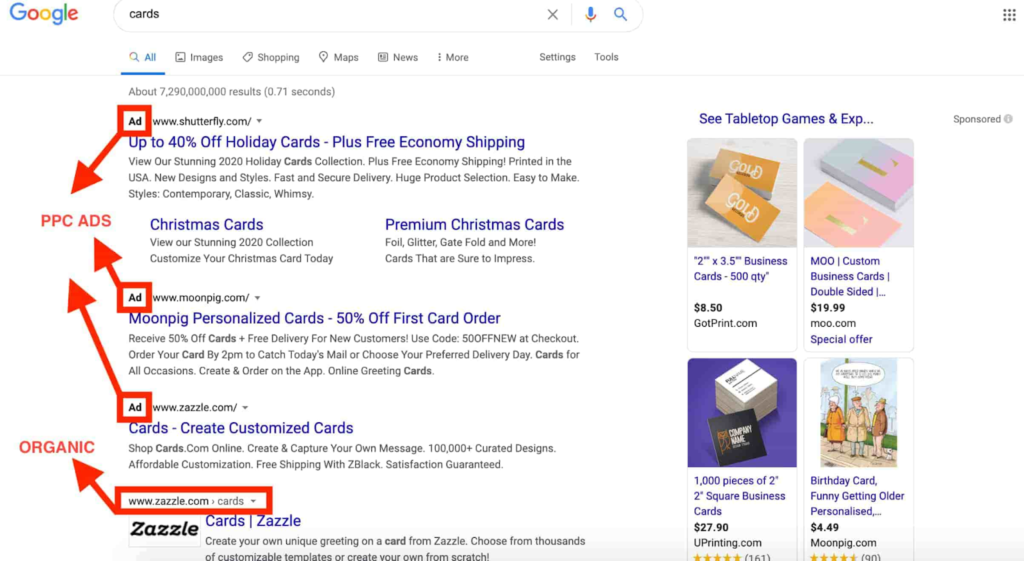
With increased competition, businesses require intelligent content marketing strategy steps that account for a smart ad budget for online promotions.
For any business looking to go online, here are a few simple steps that can be followed to kickstart your content marketing efforts online.
Build your Content Marketing Strategy
Whether you want to create social media posts to regularly engage with your audience on Facebook or LinkedIn or want a strategy to develop intellectual property for enterprise consumption, you can build your content marketing strategy template in a few simple steps.
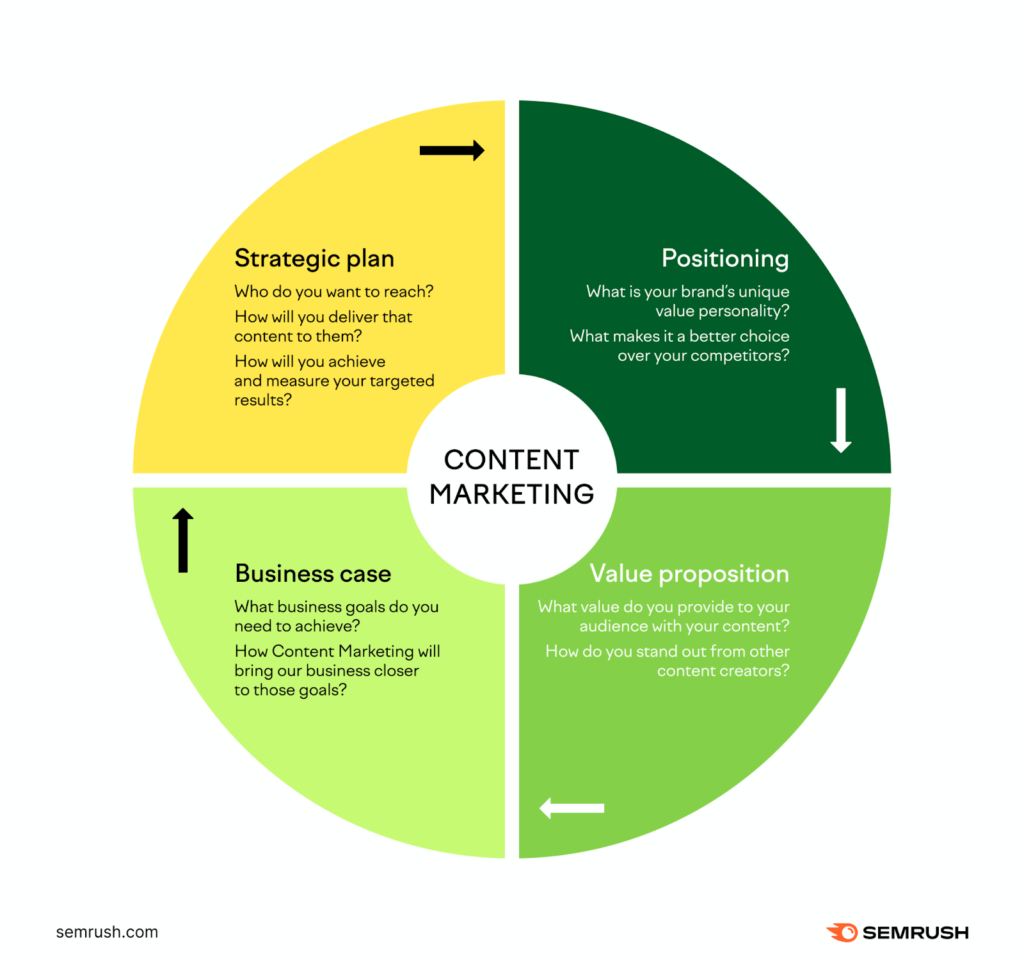
Here’s what you need to consider.
1. Well-defined goals
Smart goals help you assess the performance of your content as your business grows. Setting clearly defined objectives can help you streamline your time and budget to ensure the best outcome. Knowing what your ideal customer expects can help you deliver content that wins their hearts.
Examples of goal-setting for a content marketing strategy include:
- Creating brand awareness
- Boosting conversions
- Increasing revenue
- Fostering brand loyalty
- Nurturing customer engagement
- Lead generation tactics
- Partnerships and promotional channels
Once you have defined your goals for each piece of content that goes online, it’s important to set objectives to achieve these goals.
2. Set up Key Performance Indicators (KPIs)
Knowing what your ideal customer expects is not enough; you have to compete with the market for their attention. Engagement differs with each type of content. When designing a content marketing strategy, you have to outline the indicators of your content performance online. On Facebook, you may be looking to get more likes, shares, or comments. On YouTube, you may be looking to get more views. On LinkedIn, you may be looking to generate more leads for your business. On Google, you may be looking to get more clicks on your page.

Setting clear KPIs to indicate the success of your content marketing strategy is vital. Ideally, always push for more engagement with the market.
3. Picking the right content for each channel
Extensive research can reveal the best-performing types of content for each promotional channel. Learning how to design visuals for Google ads and learning how to design creative posts for social media are different experiences. Each platform has a unique persona, and you must analyze the ideal persona of your customer. By understanding the type of content your ideal target audience will relate to, you can choose the best promotional channel to reach them.
4. Set a budget
Fixing a budget is an integral part of a content marketing strategy. You have to dedicate a budget to content creation, design, social media management, paid ads, and everything that comes under the umbrella of your content plan. Never undercut the funding and maintain a floating buffer to optimize your content marketing strategy as the requirements become more apparent.
5. Distribute content and examine the response
Once you have a solid content marketing strategy in place, you can begin distributing your content on channels like your website, landing pages, social media, third-party platforms, and email, to name a few. Utilize every opportunity to track and analyze the response to your published content. With the latest tools, you can have in-depth insights into the performance of your content. You can use this data to improve your content and create space for more user engagement.
The goal of a content marketing strategy is to increase user engagement. Creating personalized experiences and offering seamless interactions with your brand can boost your credibility in the market. With a solid plan, you can make your dreams materialize.
Key Takeaways
- One needs an internet content marketing strategy to help promote their content. By providing valuable information for free, a business gains the trust of its consumers. A content marketing strategy also helps in establishing a brand’s authorial voice.
- A content marketing brief will help you streamline your brand’s content marketing strategy. It contains guidelines on which platforms to optimize, what kind of content to post, and how often to post content.
- A content marketing strategy could optimize different types of content marketing from blog posts, social media marketing, video content marketing, podcasts, infographics, etc.
- To build a successful content marketing strategy, one must define their target audience and set realistic goals. Defining a target audience is very important as it decides the course of action for your entire content marketing strategy.
- Another tip for building an effective content marketing strategy is to place key performance indicators (KPIs) like blog subscriptions, conversion rate, website visitors, etc., in place to track your marketing progress.
- The most important tip to create a successful content marketing strategy is to set aside a proper budget.
- A content marketing brief would also include tips to pick the correct type of content that resonates with your target audience. Mix and match different types of content to keep things engaging. Also, visually appealing content fosters more engagement from the audience for all the right reasons.
- A content marketing strategy would only be successful when it reaches the right audience; hence, defining content distribution channels is important.

Conclusion
There is no doubt that content is king these days, making content marketing one of the best forms of marketing. Internet content marketing hinges on the principle that by providing free and valuable information, a company can gain the trust of its consumers. A content marketing brief would outline the steps to reach business objectives. A content marketing strategy mixes and matches different types of content that suit the interests of the business’s target audience and posts them consistently. When the customers find value in a brand, they are more willing to purchase the product.
FAQs
Content marketing is using content to promote your brand on various online channels. This can help generate quality leads for your business. The content used is of all types and formats like blogs, Tweets, videos, memes, etc. A company can reach its objectives, convert more customers, and build a compelling social media presence with a well-defined content marketing strategy.
The essential components of internet content marketing are:
– Considering a mobile-friendly strategy
– Search engine optimization
– Social media marketing
– Content marketing
– Nurturing website visitors and email marketing
The three most important factors on which a content marketing strategy rests include:
– SEO: Search engine optimization (SEO) is the process of inputting keywords into one’s content. It helps in ranking content on search engines.
– Social Media: A consistent social media presence would work wonders for a brand’s content marketing strategy.
– Content: Content is king. If you cannot provide value for your audience, they would not want to invest in your brand.
An area that most content marketers struggle with is maintaining a consistent posting schedule. If you are running out of content creation ideas, use Peppertype.ai. It is powered by artificial intelligence and brought to you by Pepper content. It is an instant content generator.
Examples of content marketing include brands that have aced different types of content, making it fruitful for their businesses. Every company that built a brand image online, on other social media platforms has posted various types of content. Video content marketing is one of the most popular internet content marketing tactics. The pandemic has seen a surge in short and snackable content. The already depleting attention span of humans became even lower in this pandemic. No wonder short and engaging content remained at the forefront. The brands that could optimize these trends also gained popularity.
Search engine optimization (SEO) is the practice of including popular search phrases, or in other words, keywords in his content. These keywords have to be geared towards their target audience. Including an adequate sprinkling of keywords in one’s content increases their chances of ranking on search engines. With more visibility, a brand’s website gains more organic traffic, thereby increasing the possibility of lead generations and conversions. Therefore, we can say that keyword research plays one of the most important roles in devising a content marketing strategy.
Latest Blogs
Explore how Google’s 2025 AI search updates triggered ranking chaos. Learn actionable strategies to adapt your SEO for AI Overviews, zero-click searches, and SERP volatility. Stay ahead now.
Learn how to rank on AI search engines like ChatGPT, Perplexity, and Gemini by optimizing your content for authority, structure, and relevance. Stay ahead in AI-driven search with this strategic guide.
Explore the best healthcare SEO services for your medical practice. Improve online visibility and effectively reach more patients in need of your services.
Get your hands on the latest news!
Similar Posts

Content Marketing
4 mins read
11 Best B2B Content Marketing Agencies for B2B Companies in 2024

Content Marketing
5 mins read
Top ecommerce Marketing Agencies with Proven Strategies for 2024

Content Marketing
5 mins read